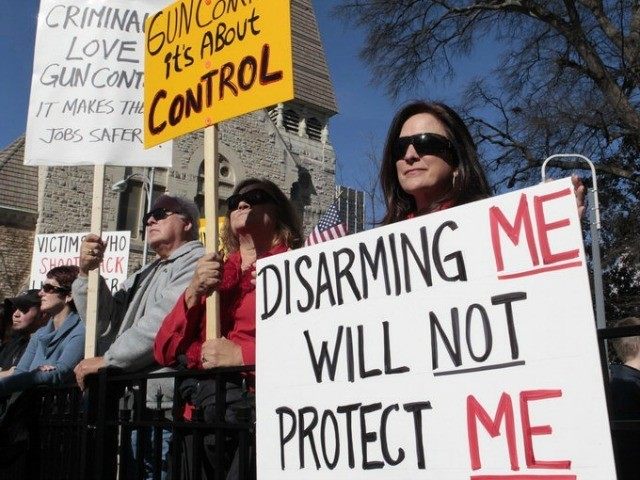On August 30, Salon suggested society may have reached a tipping point, where Americans are unable–or unwilling–to think of supporting any new gun control proposed by “extremes.”
Salon makes this point via an interview with UCLA cognitive psychologist Keith Holyoak, who explained that Americans are now so entrenched on one side or the other that any real chance of passing more gun laws is less and less likely.
Because media is not like it used to be–there are now viable options to the mainstream’s bias–people have different outlets to which they can turn for news on certain events, and Holyoak says people instinctively turn to the outlets with which they most agree. He stressed that this pushes the minds of already-divided Americans further and further apart.
He said:
We know that people in the United States now get their information from media that support their beliefs. So people with other beliefs are not being exposed to the same evidence–that sort of pressure is going to lead to more extreme positions rather than some graceful convergence of minds.
Holyoak asserted that we are not “doomed to push to extremes forever and never reach agreement,” but he says that as Americans move down one path or another–a pro-Second Amendment path or an anti-Second Amendment position in this case–they continually pick up evidence, or so-called evidence, that reinforces their position, thereby keeping them on the path they have chosen.
And he highlighted secondary factors that many fail to take into consideration.
For example, Holyoak points to the role that “emotion” played in closing the door to Centers for Disease Control and Prevention involvement in gun control via public health studies. He indicated that their proposed involvement triggered the same kind of response as other “hot-button debates [like] climate change [and] the anti-vaccination movement,” and once emotion is in charge, facts one way or another are casualties.
Because of these things–the constant feed of evidence combined with the occasional surge of emotion–even a new and highly grotesque attack like the one Vester Lee Flanagan committed on film leaves Americans politically unmotivated regarding gun control. Supporters of the Second Amendment are heartbroken that two innocent people lost their lives at the hands of an angry former co-worker, but they understand that the number of defense gun uses per year far outweighs criminal uses, so they are not willing to curtail Second Amendment rights any further on a crime-by-crime basis.
On the other side of the coin, anti-Second Amendment Americans have reacted to the Virginia attack the same way they reacted to the attack on the Aurora movie theater or Virginia Tech University, pushing the same policy they pushed for both of those–background checks–completely oblivious that the gunman who killed Parker and Ward passed a background check for his gun.
So it’s a stalemate. And when asked if there is a chance that crimes on the level of Flanagan’s may cause more Americans to support gun control in the future, Holyoak said, “My conjecture would be on the pessimistic side.”
Follow AWR Hawkins on Twitter: @AWRHawkins. Reach him directly at awrhawkins@breitbart.com.

COMMENTS
Please let us know if you're having issues with commenting.